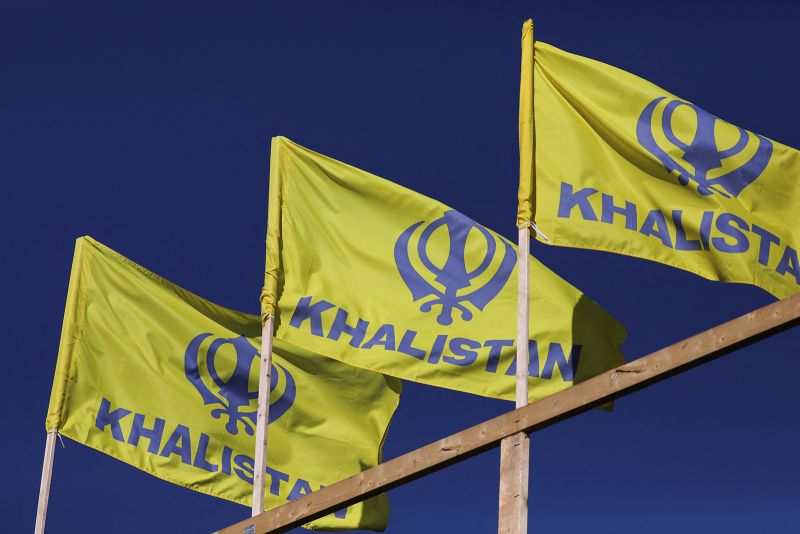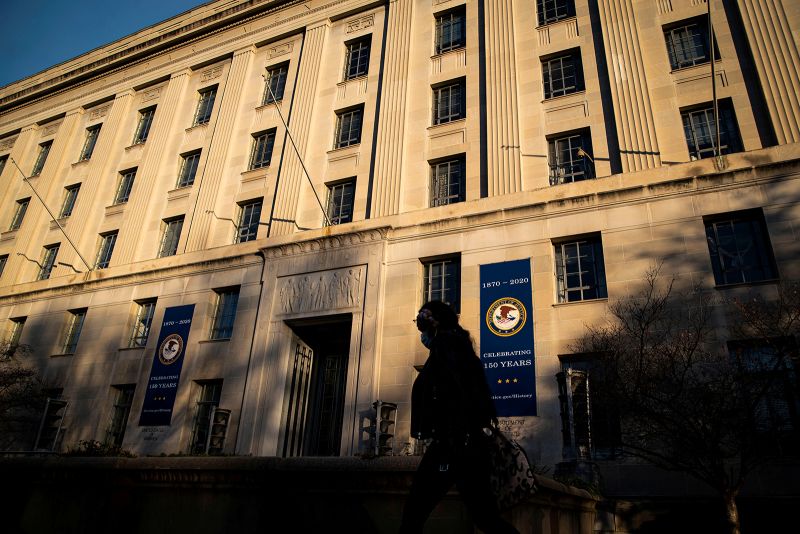
FBI Director Visits India After Explosive Indictment in US Assassination Plot

FBI Director Christopher Wray's visit to India aims to bolster security cooperation and strengthen the partnership However, recent law enforcement challenges between the nations pose a grave threat to this alliance, potentially tarnishing reputations
Christopher Wray, the director of the FBI, is currently in India to enhance security cooperation and strengthen the partnership between the two nations. However, this visit follows a serious law enforcement issue involving an Indian government official accused of being involved in a conspiracy to murder an American citizen on US soil.
Gurpatwant Singh Pannun, a Sikh separatist, was reportedly the intended victim of a murder-for-hire scheme in New York City. In India, he is wanted and labeled a terrorist and national security threat, but to many Sikhs abroad, he is a vocal activist uniting a significant portion of the community's global diaspora for a common cause.
In late last month, US federal prosecutors accused an Indian national of attempting to kill someone, citing an explosive indictment that claimed the hitman was following orders from an unnamed Indian government official.
This startling disclosure occurred just over a month after Canadian Prime Minister Justin Trudeau publicly suggested that India may have been linked to the killing of another Sikh separatist, Hardeep Singh Nijjar, on Canadian soil. This led to an angry reaction from New Delhi and triggered a diplomatic rift between the two countries. India has adamantly denied any involvement in Nijjar's murder.
The US plot was thwarted, and the specific details have not yet been presented in court. However, as Suhasini Haider, the diplomatic affairs editor at The Hindu newspaper, noted in a recent editorial, the incident has tarnished New Delhi's credibility.
And it has many asking: How badly had this hit New Delhis ties with Washington?
Taking matters seriously
The government of India has denied any connection to the purported plan to assassinate Pannun. However, unlike the strong disapproval expressed after Canada's accusation, it has established a top-level committee to probe the claims in the US indictment.
Following the revelation of the indictment, India's foreign ministry stated, "The case against an individual lodged in a US court, supposedly linking him to an Indian official, is a cause for concern."
Pannun has been advocating for the creation of a separate Sikh homeland known as Khalistan, which would include the state of Punjab in India. Despite being outlawed in India, Khalistan still commands sympathy among some Sikhs in the diaspora, who are able to openly advocate for secession from India under free speech laws. The painful memories of a deadly insurgency by Sikh separatists continue to haunt many Indian citizens in the world's largest democracy.
The subject is emotionally charged. Forty years ago, the Sikh bodyguards of Indira Gandhi, India's former prime minister, assassinated her after she ordered army troops to enter the religion's most sacred shrine to remove separatists who had been hiding inside. This operation, known as Blue Star, caused extensive damage to the building and resulted in the deaths of hundreds of people.
The first photos of the damaged Akal Takhat after the army action named Operation Blue Star on the sikh Golden Temple complex in Amritsar, June 9, 1984.
Sondeep Shankar/Hulton Archive/Getty Images
After Gandhi's assassination, riots erupted and resulted in the deaths of about 3,000 people, mostly Sikhs, as per official records, making it one of the most severe instances of communal violence since India was partitioned. Following the government's prohibition of the movement, those advocating for the Khalistan cause have become a minority in Punjab, and analysts claim that associated extremism does not pose a substantial danger to the country.
Several Sikh organizations overseas are pushing for Punjab secession and seeking reconciliation for what they see as human rights abuses against their community. They argue that the Khalistan movement is wrongly labeled as terrorism by the Indian government. However, Prime Minister Narendra Modi's administration continues to maintain a strong stance against these advocacy efforts.
No dent in relations
"The Khalistan movement in the 1980s was a challenging period for India and had a significant impact on their national security," commented Harsh Pant, vice-president of the Observer Research Foundation, a think tank based in New Delhi. "As a result, the Indian government approaches such matters with extreme seriousness."
No dent in relations
Pannun, the Sikh separatist wanted by the Indian government, had a close connection to Nijjar, who was also wanted by India for terrorism-related activities. Known for his passionate speeches, Pannun has frequently made remarks that are seen as advocating for separatism and making threats towards India and its government.
He faces over a dozen terrorism charges in India and is accused of attempting to radicalize his community in support of creating Khalistan, an independent Sikh homeland that would encompass parts of India. India has banned Sikhs for Justice, a secessionist group based in the US that is led by Pannun, and which conducts referendums among diaspora groups in favor of Khalistan.
In a widely viewed video last month, he cautioned Sikhs against flying Air India on November 19, warning of potential danger to their lives. The ensuing headlines in India suggested that Pannun had threatened to "blow up" the aircraft.
Pannun told CNN he was "not surprised" by the indictment outlining the foiled plot to kill him.
Hardeep Singh Nijjar, a Canadian Sikh leader who was shot dead in June.
Sikhs For Justice
The government of India has put a bounty on my head for leading the global Khalistan Referendum campaign," he stated. This refers to the votes held by the Sikh diaspora worldwide to rally support for an independent homeland.
When questioned by CNN about whether he poses a threat to India, in line with New Delhi's allegations, he responded, "Although my advocacy does challenge India's territorial integrity, it is done through ballots rather than bullets. Therefore, the challenge I present is not classified as terrorism under UN and international laws."
He expressed that the Indian media frequently distorts his comments regarding Air India. He clarified, "My message is to encourage a boycott of Air India, not to promote violence. The Modi government of India is using disinformation to wrongly associate a non-violent boycott with terrorism."
Pannun's incendiary language, along with the media attention he receives in India, may incite a strong reaction from citizens and prompt a governmental response, according to analysts.
"Regular inflammatory statements and their broadcast by the Indian media can escalate diplomatic tensions," Pant explained. "Many Indians may question why the US government is allowing this behavior. The public's perception of the threat may be greater than the actual danger."
Khalistan flags advocating for independence are displayed at the Guru Nanak Sikh Gurdwara temple, where Sikh leader Hardeep Singh Nijjar was killed in June 2023, in Surrey, British Columbia, Canada on September 20, 2023.
Chris Helgren/Reuters
The Indian government's reported pursuit of an American citizen on its own soil may be perceived as risky by some, potentially causing strain in the recently improved economic, technological, and defense relations between the two countries.
Analysts believe that the likelihood of a significant fallout is low, as both countries are dedicated to addressing the threat posed by China, which they see as a shared concern. "The prevailing belief is that the US and India require each other for essential strategic reasons: primarily, to present a united front in competition with China," stated Daniel S. Markey, senior adviser for South Asia at the United States Institute of Peace.
As a result, they will address this issue while staying focused on their mission. Additionally, the two parties have refrained from making hostile public remarks and have committed to addressing the issue earnestly. This kind of practical realpolitik has been observed recently.
The murder of Jamal Khashoggi in the Saudi consulate in Istanbul sparked global outrage and US condemnation due to his critical stance of the Saudi government. However, despite the initial uproar, the relationship between Washington and Riyadh has since been restored.
Announcing Wrays visit on Monday, India's Central Bureau of Investigation, equivalent to the FBI, stated that their meeting symbolized a move towards strengthening cooperation and shared dedication to combating crime in all its forms through international police cooperation.
The statement did not mention the US indictment.
Reputational cost
Some may interpret the measured response from the US and India as an indication that India's highest-ranking officials were not aware of the alleged plot.
Pant expressed his skepticism, stating, "I find it hard to believe that it reaches the highest levels. Primarily because the potential consequences are too significant... And if we consider this as a rogue element, then the question is, who has lost control?"
The US indictment claimed that Nikhil Gupta, 52, collaborated with an unidentified Indian government official to arrange a meeting with an undercover officer whom he thought was a hitman to go after Pannun. The Indian official agreed to pay $100,000 to the undercover officer for the planned assassination, as per the prosecutors.
A woman walks past the U.S. Department of Justice Building, in Washington, U.S., December 15, 2020.
Al Drago/Reuters/File
Indian man charged with attempted murder-for-hire against Sikh activist in the US. The hitman contacted by Gupta turned out to be an undercover officer from the Drug Enforcement Agency, as per the DEA. Gupta was arrested in the Czech Republic in June of this year under a bilateral extradition treaty.
The incident has had minimal impact on the government's reputation in India. According to Markey from USIP, there are hard-liners who may view the episode as a show of strength for India and as a necessary warning to other international critics of the Indian government.
Pant acknowledged that there may be some "fringe" support for the purported attack on Pannun's life, but the government is aware of the complexities involved in the case. He stated that there has been a swift response to America and a committee has been formed to investigate the matter, emphasizing the serious implications at hand.
If the alleged connections to the Indian government are confirmed, Markey warned that the country's skilled intelligence officers will suffer damage to their reputation. "Indian diplomats, particularly those in Washington and Ottawa, will be responsible for managing the aftermath," he added.












